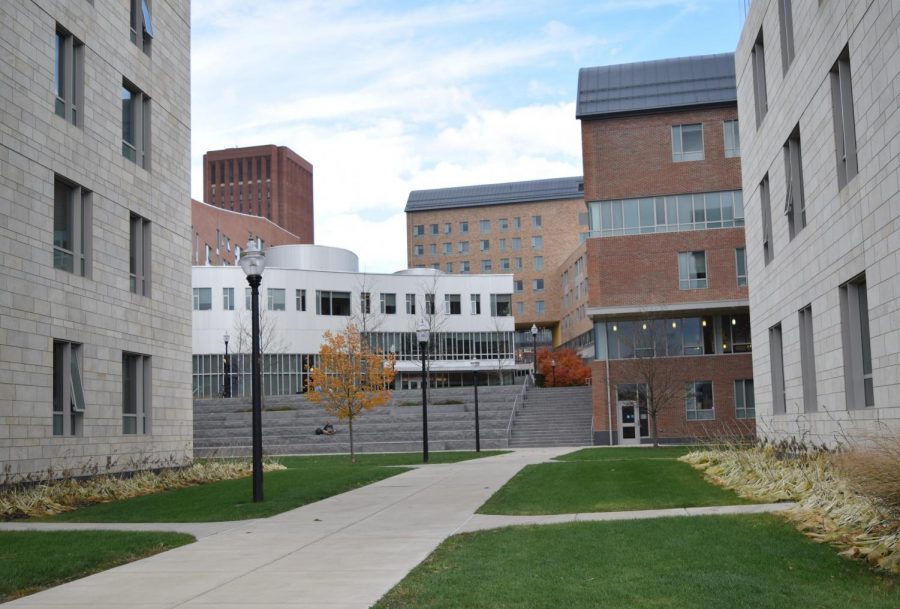Along Commonwealth Avenue on the University of Massachusetts campus stands the Commonwealth Honors College Residential Community, a conglomerate of buildings that houses thousands of the College’s students.
First started in 1999, the CHC provides a singular honors college for a variety of programs across campus. According to the UMass Honors website, the CHC “offers an honors curriculum that incorporates general education and advanced scholarship for undergraduates in any of the University’s majors.”
The college also provides “specialized academic programs, supportive advising, close connections with faculty, extensive opportunities for research and leadership development” for CHC students.
The CHCRC, which was built in 2013, consists of six dorm halls. Sycamore Hall and Oak Hall, serve as dorms for first-year students, while the four others, Birch Hall, Elm Hall, Linden Hall and Maple Hall house multi-year students. Those who live in the CHCRC are a part of the CHC program.
Lili Olsen, a junior psychology major and an employee at the CHCRC Residential Service Desk, has been a part of the Honors College since her freshman year, first living in Oak Hall before living in Birch Hall her sophomore year.
To Olsen, the dorms were “Super clean, nice, amazing facilities.” She also explained that the dorm walls were made of plastic and that push-pins had to be used to hold up decorations in the dorm in lieu of command strips.
Olsen also gave high praise to the CHC community, noting that she met her “best friends” at the CHC.
“We all kind of bond over studying together, and also letting off steam because there are a lot of common rooms and activities we can do together in the buildings,” Olsen said.
Another CHCRC resident, Milo Cason-Snow, a junior computer science major, felt similarly about the dorms, describing them as “modern” and “well set-up.”
Cason-Snow first lived in the Northeast Residential Area before moving into a four-person suite at Maple Hall in his sophomore year. For Cason-Snow, his CHC community was formed through meeting the students in his building and the students he met through taking similar honors classes.
According to Olsen, the CHCRC contains several spots for students to study and complete assignments, such as common rooms or the shared living rooms that come with every suite. In addition, every suite has a chalkboard on the wall that students can use for studying. Olsen described the shared living rooms as a “conducive space for studying and group building and working together as a team.”
The halls also contain games in the lobbies and lounges of each dorm building, including a pool table in Maple Hall and a ping pong table in Oak Hall.
As for something non-CHC students may not know about, Olsen mentioned the CHC events hall located in Roots Café. The space provides a study spot as well as a piano so students can “relax and listen to some music,” she said.
Students who are a part of the honors program must follow an honors curriculum. In the first two years, students will complete a “Breadth of Study” which involves taking the Ideas that Change the World seminar, the Honors College Writing Course, the Honors Discovery Seminar and two general education honors courses.
In the second half, CHC students are required to complete a “Depth of Study.” This phase includes picking a single major or studying through multiple disciplines. In this phase, students must take two honors level courses and complete an honors thesis.
Additionally, all students must meet a 3.4 cumulative grade point average. One semester below the level leads to academic probation, and two semesters below leads to removal from the CHC.
To Cason-Snow, the GPA requirement is “about right.”
“From what I’ve talked to with other students, it seems to be a good restriction to maintain some academic excellence in the Honors College, but it’s not too stressful since most students who are in the Honors College are already striving to achieve those great things,” he said.
Olsen felt similarly. “I think if you are being held to a certain level and you are given this title of honors, then you should be able to stay in that level of GPA,” she said.
Olsen also said the CHC provides academic advising for students who may fall below the GPA threshold.
Drawbacks to the honors college, according to Cason-Snow, include the CHCRC’s distance from the “swipe-in dining halls,” with Hampshire and Berkshire Dining Commons located in Southwest Residential Area and Worcester and Franklin Dining Commons located near Northeast and Central Residential Areas. All four dining commons are swipe-in dining halls.
Located in the CHCRC is Roots Café, which serves quick meals during breakfast through Grab-and-Go, while also serving lunch and dinner meals that can be purchased with dining dollars through a student’s meal plan.
Cason-Snow also reflected negatively on the $600 Honors College Fee that all CHC students are required to pay per year.
“I think that it’s probably worth it in a lot of cases but for students struggling financially, it could be a bit of a burden,” he said.
Will Mallas can be reached at [email protected] and followed on Twitter @willmallas.




















